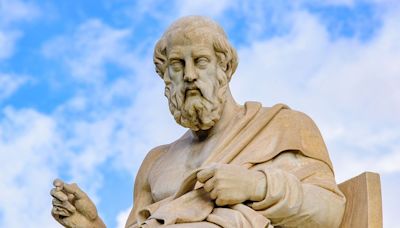Search results
Mar 20, 2004 · Plato (429?–347 B.C.E.) is, by any reckoning, one of the most dazzling writers in the Western literary tradition and one of the most penetrating, wide-ranging, and influential authors in the history of philosophy.
Aug 9, 2023 · Ancient Greek philosopher Plato was a student of Socrates and a teacher of Aristotle. His writings explored justice, beauty and equality, and also contained discussions in aesthetics, political...
Apr 3, 2023 · Plato (l. 424/423 to 348/347 BCE) is the pre-eminent Greek philosopher, known for his Dialogues and for founding his Academy in Athens, traditionally considered the first university in the Western world. Plato was a student of Socrates and featured his former teacher in almost all of his dialogues which form the basis of Western philosophy.
Plato (427—347 B.C.E.) Plato is one of the world’s best known and most widely read and studied philosophers. He was the student of Socrates and the teacher of Aristotle, and he wrote in the middle of the fourth century B.C.E. in ancient Greece.
Plato , (born 428/427, Athens, Greece—died 348/347 bc, Athens), Greek philosopher, who with his teacher Socrates and his student Aristotle laid the philosophical foundations of Western culture. His family was highly distinguished; his father claimed descent from the last king of Athens, and his mother was related to Critias and Charmides ...
Life of Plato. Plato ( Ancient Greek: Πλάτων, Plátōn, "wide, broad-shouldered"; c. 428/427 – c. 348/347 BC) was an ancient Greek philosopher, the second of the trio of ancient Greeks including Socrates and Aristotle said to have laid the philosophical foundations of Western culture. [1]
Plato was the first great philosophical exponent of the soul in the West. He depicted its rational component as a ruler overseeing the jumble of constantly changing and often conflicting states that reach human awareness through perception and become objects of human attachment through desire.






